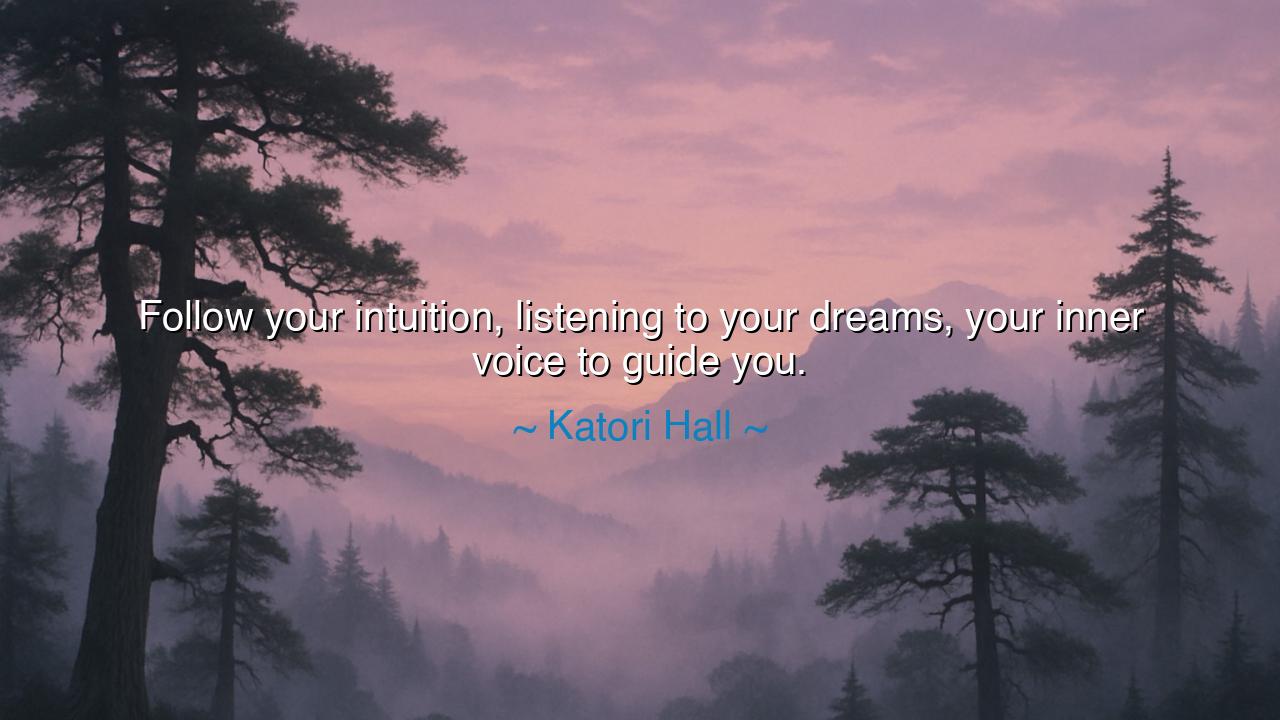
Follow your intuition, listening to your dreams, your inner voice






In the powerful words of Katori Hall, "Follow your intuition, listening to your dreams, your inner voice to guide you," we are called to trust the deep wisdom that resides within each of us. Hall’s words echo a truth that the ancients held dear—that within the heart of every person lies a compass, a guiding voice that, if heeded, can lead us toward our true path. This inner voice, often drowned out by the noise of the world, is our most honest and authentic guide. It speaks to us in moments of stillness, when we are open to listening. To follow it is to embrace the ancient wisdom of intuition—a wisdom that transcends logic and reason, leading us to a higher truth.
The concept of intuition as a guide is as old as humanity itself. In ancient Greece, the great philosopher Socrates was known to speak of a divine inner voice, which he referred to as his "daimonion". This voice, Socrates claimed, would warn him when he was about to make a wrong decision, guiding him through moral dilemmas and helping him find the right path. It was not a voice of reasoning or logic, but one that came from the very essence of his being. Socrates believed that this voice was not just a personal tool, but a divine gift, allowing him to align his actions with the greater good. In this way, his inner voice was his truest compass, just as Hall suggests we should trust our own.
Consider the story of Joan of Arc, the courageous young woman who led the French army to victory during the Hundred Years' War. Joan, an illiterate peasant, claimed to have been guided by divine voices—visions of saints and angels who gave her the confidence and vision to lead an army. Her intuition, though dismissed by many as madness, became the foundation of her legendary leadership. Joan’s unwavering belief in the guidance of her inner voice changed the course of history. Like Socrates and Hall, she exemplified the power of trusting one’s own inner guidance, even when the world around her failed to understand or support her. Her story teaches us that true courage lies not just in taking action, but in listening to and trusting the inner whispers that guide us.
The importance of listening to your dreams is another profound aspect of Hall’s quote. Dreams have been revered by cultures throughout history as portals to deeper wisdom. The ancient Egyptians, for instance, placed great importance on dream interpretation. They believed that the gods communicated with them through their dreams, offering guidance and insight into their futures. In many indigenous cultures, dreams were seen as sacred messages, a way for individuals to connect with the spiritual realm. The oracle of Delphi, in ancient Greece, would often send dream-like visions to those seeking advice. These dreams, filled with symbols and messages, were seen as ways to align the dreamer with the greater forces of the universe. Hall’s call to listen to our dreams is not merely a poetic notion, but an ancient practice of seeking wisdom from beyond the ordinary realm.
Hall also speaks of the inner voice—a voice that is often quieter than the demands of the world around us. In the life of Martin Luther King Jr., we see a man who trusted his inner voice, despite the external pressures of a divided society. King’s vision of a nonviolent society was not a product of external influences, but of his deep conviction and inner guidance. His famous words, "I have a dream," were not just political statements, but expressions of his inner vision for a world of justice and equality. King’s ability to listen to his own inner voice amidst the chaos of the civil rights struggle made him a heroic figure, a beacon of hope for generations. Like Hall’s call, King’s life reminds us that the most profound change begins not in the outside world, but in the voice within.
The lesson we draw from Hall’s words is clear: we must cultivate the practice of listening to our inner voice and intuition, even when it defies reason or logic. Too often, we are swept away by the currents of society’s expectations, drowning out the quiet whispers of our own hearts. Intuition is not about abandoning reason, but about harmonizing it with the wisdom of our deeper selves. It is about seeking balance, where we align our actions with our true calling, rather than with the fleeting desires of the world around us. Just as the ancients revered dreams and visions as sacred, so too must we learn to trust the inner guidance that can lead us toward a more fulfilled and purposeful life.
In our own lives, let us be mindful of the moments when our intuition speaks—when the quiet voice within urges us toward a certain path, a certain decision, or a certain purpose. The next time you feel the pull of inner wisdom, do not ignore it. Take a moment to listen, to reflect, and to trust that dreams, intuition, and the inner voice are not mere fantasies, but profound guides to a life well-lived. In doing so, we honor the timeless wisdom of those who came before us and create the space for our own unique path to unfold with grace and clarity. Trust the whispers of your heart, for they are the echoes of a greater truth waiting to be discovered.






AAdministratorAdministrator
Welcome, honored guests. Please leave a comment, we will respond soon